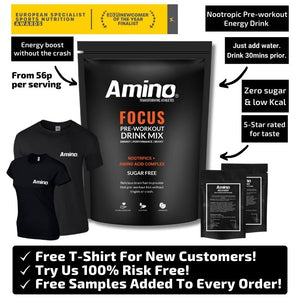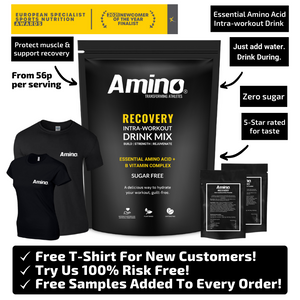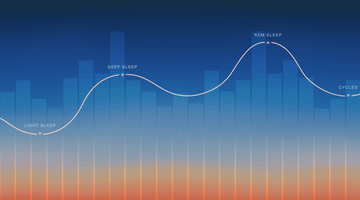Looking for an edge in your next workout? You may want to consider using a nootropic pre-workout. Nootropics are supplements that can help improve cognitive function, including focus, concentration, and motivation. In this blog post, we'll take a look at the top 10 benefits of using a nootropic pre-workout so you can make an informed decision about whether it’s for you.

What is a nootropic pre-workout?
Nootropics are ingredients and formulas specifically designed to work on the brain rather than the body. When used in a pre-workout, they deliver a ton of other benefits including sharper attention, better mental clarity, and clearer focus without the distinctive post-workout of a traditional pre-workout.
So whatever your sport and whatever your training goals, turning up and trying your best is essential if you want to make improvements over time. Whether it's building muscle, losing fat, improving health or making progress in your chosen sport, a nootropic pre-workout supplement can give you the energy and focus you need to achieve results. They can even give you a boost while working or gaming!
Getting the correct blend of nutrients to the brain and central nervous system at the correct time and in the correct dose, however, is crucial to driving results. Our new pre-workout supplement, Focus, is a unique formula designed to do just that.
The benefits of a nootropic pre-workout?
Specific free-form amino acids can enhance the benefits of nootropic compounds in your supplement and give you the edge over your competition. In combination, they support energy production, neural drive, motivation, focus, memory and cognition.
Although they’re not for every athlete and must not be abused, they can be very useful for specific people in specific situations.
But how do you know whether a nootropic/amino acid pre-workout supplement is a good option for you? We’ve compiled a list of the top 10 benefits to help you decide.
1. Improved Physical Strength
Our body’s ability to produce force is fundamental for movement, strength, speed and overall performance. Nootropic stimulants, such as caffeine, have been shown to enhance the body’s ability to produce and sustain force over time.
Caffeine is a powerful stimulant and it primarily counteracts the effects of adenosine, a compound that signals to the brain that it’s time to relax. The inhibition of adenosine can influence the dopamine, serotonin, acetylcholine and adrenaline systems. As a result, caffeine promotes alertness and wakefulness.
Studies show a reliable and significant increase in power output (both weight-lifting as well as cycle ergometer measurements) in both trained and sedentary people who took caffeine doses in excess of 5mg/kg. [1,2].
2. Improved Work Capacity & Training Volume
Work capacity refers to the number of sets, reps, power output and time to exhaustion achieved during a workout. The ability to complete a training session and invoke a training response in the body is key to making improvements over time. Certain compounds are thought to assist with this process.
Citrulline is an amino acid used to promote arginine, which regulates blood flow. It is also key to nitric oxide metabolism, which affects the flow of energy to your muscles. When used before training it has been shown to promote improved work capacity, power output and training volume. Research also seems to show improvements in close proximity to the end of a workout, when its ability to reduce fatigue is evident. Other research demonstrates that its effects are more evident when used consistently. [3,4]
3. Enhanced Power Output
Power output is a key metric in any training programme. The ability to produce high levels of power, or sustain power over time, is what separates athletes from those with a more sedentary lifestyle.
Power is affected by the central nervous system's ability to produce power by increasing neural drive to the muscles. A nootropic pre-workout supplement that contains caffeine and Alpha-GPC is shown to enhance the central nervous system’s ability to produce power, force and velocity. [5,1]
4. Reduced Fatigue
Fatigue plays a crucial part in the stimulus and adaptation process. It tells your body when it’s at the limits of its current capabilities. This can be due to the accumulation of work or because the body is depleted psychologically, physiologically or biochemically. In short, fatigue tells us when to stop. However, in many cases, fatigue makes us stop early to preserve energy.
To push your performance, you sometimes need to work beyond fatigue. Nootropics like tyrosine, caffeine and citrulline affect the central nervous system and biochemical processes, allowing us to do just that. This is especially useful in competitive environments, so we can push harder for longer.
Tyrosine, for instance, has been shown to reduce fatigue by boosting the drive and motivation reward mechanisms in the brain. It has been studied by military personnel under acute stressors, such as sleep deprivation.
Citrulline, on the other hand, works at a cellular level. It improves blood flow, allowing muscle tissues to do more work.
Acetyl-L-carnitine appears to reduce fatigue in older adults with low muscular endurance and there is some evidence to show improvements in athletes too.
And, as already covered, caffeine blocks the nervous system’s relaxation pathways and increases wakefulness, counteracting the effects of fatigue.
In combination, these compounds can help you go beyond fatigue and drive greater results. [5,7,4]
5. Enhanced Wakefulness
To promote wakefulness, athletes should optimise their sleeping habits. Sleep is the most effective way to prevent excessive fatigue. Sleep quality and sleep duration are key, but improvements aren’t always possible in our always-on world.
Obviously, caffeine is a powerful stimulant and can be used to enhance wakefulness when rested. It can also create a state of energy when the body or brain is overworked or insufficiently rested. These effects are not long-lived but can be useful when used for a short period.
It’s important to remember that habitual caffeine use causes its effects to diminish. In extreme cases, the only benefit is caffeine’s anti-sleep effect. This is an ‘insurmountable’ tolerance, which means you cannot overcome the problem with more caffeine. If you want to reduce your tolerance, you may need to take a break from caffeine. [1,9,2]
6. Improved Attention & Focus
The ability to stay focused on the task at hand – even when fatigued – is crucial to mental and physical performance and certain pre-workout supplements can help with this.
Although it’s not a common part of our diets, L-theanine is a non-essential amino acid that has been shown to improve attention and executive function. In brief, L-theanine promotes the production of GABA in the brain. Benefits include the reduction of anxiety or jitters, which may occur with high doses of stimulants like caffeine. As a result, it can give you a clear mind and a steady hand. [8,9]
7. Increased Motivation
At work or during training, the ability to start and complete a task is important for productivity. However, your motivation levels vary depending on your recovery state and the environment you're in.
L-tyrosine is an amino acid used by the body to produce noradrenaline and dopamine. Both of these neurotransmitters are involved with motivation. L-tyrosine has been shown to reduce stress on the mind in fatiguing situations (which depletes noradrenaline and motivation). As such, the amino acid may help to prevent stress-induced memory and attention deficits.
Studies have also noted that noradrenaline may exert a protective effect on the brain. Supplementing with L-tyrosine seems to create a 'safety buffer' of noradrenaline building blocks that can prolong the anti-stress effect. This has been noted in studies of cold stress, psychological stress and sleep deprivation in humans. [7,10]
8. Enhanced Endurance
Endurance is the ability of an organism to exert itself and remain active for a long period of time. There are many factors that affect endurance ranging from psychological, biochemical and physiological. Whether in training or competition, sustained endurance is key for many athletes. Caffeine, tyrosine and citrulline all promote specific pathways that enhance an athlete's ability to go harder for longer.
Caffeine acts as a stimulant and promotes wakefulness and alertness while tyrosine has been shown to enhance motivation and promote drive to complete a task, both are especially effective in fatigued situations. [11,1,2]
9. May Promote Memory Function
Not only is memory critical to learning and refining new skills, but it is vital in the decision-making process, too.
Unfortunately, memory is affected by many psychological and physiological phenomena. For instance, anxiety, stress, depression and sleep quality all have an effect on memory. Mitochondrial and metabolic health also have an impact because a sluggish metabolism is likely to reduce the brain's processing speed.
Alpha-GPC has been shown to support choline production, which supports the brain and central nervous system. Studies show that it is also effective for reducing cognitive decline. [6]
10. Improved Reaction Times
Reaction times are crucial to sports performance; an athlete’s ability to react to events as they happen is essential.
Although the overall effect is unreliable and context-dependent, a pre-workout caffeine supplement appears to improve reaction times, although this may come at the cost of accuracy. [9,1]
Find Your Pre-Workout Focus
Combining a unique formula of amino acids and nootropics, the Focus pre-workout supplement has been crafted to help you get more from your workout. Find out more about Focus here.
ENJOYED THIS ARTICLE?
Find out more about how amino acid supplements can help to support a healthy lifestyle, plus get 10% off your first Amino order.
References
[1] Diego B. Souza, Juan Del Coso, Juliano Casonatto & Marcos D. Polito (2017) Acute effects of caffeine-containing energy drinks on physical performance: a systematic review and meta-analysis.
[2] Diego B. Souza, Juan Del Coso & Marcos D. Polito (2018) Acute Specific Effects of Caffeine-containing Energy Drink on Different Physical Performances in Resistance-trained Men.
[3] Eric T Trexler, Dale S Keith, Todd A Schwartz, Eric D Ryan, Lee Stoner, Adam M Persky, Abbie E Smith-Ryan (2019) Effects of Citrulline Malate and Beetroot Juice Supplementation on Blood Flow, Energy Metabolism, and Performance During Maximum Effort Leg Extension Exercise.
[4] Joaquín Pérez-Guisado, Philip M Jakeman (2010) Citrulline malate enhances athletic anaerobic performance and relieves muscle soreness.
[5] R Gillingham, A A Keefe, J Keillor, P Tikuisis (2003) Effect of caffeine on target detection and rifle marksmanship.
[6] Tim Ziegenfuss, Jamie Landis & Jennifer Hofheins (2008) Acute supplementation with alpha-glycerylphosphorylcholine augments growth hormone response to, and peak force production during, resistance exercise.
[7] L E Banderet, H R Lieberman (1989) treatment with tyrosine, a neurotransmitter precursor, reduces environmental stress in humans.
[8] Akiko, Higashiyamaa, Makoto, Ozekib, Junejab, Mahendra P.Kapoor (2011) Effects of l-theanine on attention and reaction time response.
[9] Emma Childs, Harriet de Wit (2006) Subjective, behavioral, and physiological effects of acute caffeine in light, nondependent caffeine users
[10] Les Tumilty, Glen Davison, Manfred Beckmann, Rhys Thatcher (2011) Oral tyrosine supplementation improves exercise capacity in the heat.
[11] Carl D Paton, Timothy Lowe, Athena Irvine (2010) Caffeinated chewing gum increases repeated sprint performance and augments increases in testosterone in competitive cyclists.







